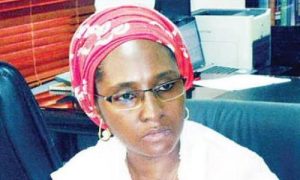The Federal Government will spend N3.53 trillion on infrastructure and human capital development.
Minister of Finance, Budget and National Planning Mrs. Zainab Ahmed made this known in Abuja at the Town Hall Meeting on the achievements of the government in infrastructure development.
Mrs Ahmed stated that in the year alone, the government planned to spend about N1.42 trillion on infrastructure and N2.11 trillion on human capital development.
The administration, she said, will spend the huge amount because it wants to prioritise the spending on infrastructure and human capital to boost rapid economic development.
Ahmed said there had been significant progress in the implementation of the Appropriation Act, particularly the capital budget.
According to her, by last November, N12.56 trillion (or 94.1 percent had been spent out of the N13.57 trillion pro rata budget. This performance is inclusive of expenditure estimates of the GOEs but exclusive of Project-Tied Loans.
At the commencement of the administration, the finance minister said N200 billion was paid for stranded power to service liabilities.
“Contract terms in power purchase agreements (PPAs) were changed from ‘Take or Pay’ to ‘Take and Pay’.
“Also, DISCOs were made to use banks for bill collections – prior to this, TCN was getting only 50 percent of proceeds. Now, TCN is financially viable and can invest in its own infrastructure,” she said.
On what the government had done in the provision of infrastructure, Ahmed said in the last three years, about N78 billion worth of tax credits had been issued to investors under the Road Infrastructure Development and Refurbishment Investment Tax Credit Scheme (RITCS). In addition, the Nigeria National Petroleum Corporation (NNPC) is to finance the construction of 21 roads across the country.
The RITCS scheme, she explained, was designed to ameliorate the burden of funding significant capital outlays on road projects by the government.
She added that the RITCS adopted the use of tax expenditures, via tax credits, to finance the construction of critical road and bridge infrastructure projects, and utilising an innovative Public-Private Participation (PPP) mechanism that is aimed at the incentivisation of private sector participation and capital investments.
Over a period of seven years (2015 – 2021), the government through the Nigerian Sovereign Investment Authority (NSIA) and the Nigeria Infrastructure Fund (NIF), she said, completed 13 projects across seven key sectors, including healthcare, education, agriculture, financial services, and housing.
Some of these completed projects, she said, “comprise the UFF-NAIC Agri Fund, established with Old Mutual to invest in processing opportunities with backward integration to primary agriculture; the Fund for Agricultural Finance in Nigeria (FAFIN) – an agriculture-focused private equity fund for agricultural SMEs across Nigeria”.
Others include the AFAM III Fast Power – a N10.4 billion investment in the procurement and local assembly of Solar Home Systems, as part of the FGN solar strategy for the electrification of five million households.
In the healthcare sector, Ahmed said the Federal Government had completed three infrastructure projects worth US$22.5 million. They include the NSIA-LUTH Oncology Centre, which has provided services to over 4,000 patients. The NSIA-FMCU and the NSIA-AKTH Diagnostic Centres – two ultra-modern facilities located in Abia and Kano states. Furthermore, both diagnostic centres have provided services to over 47,000 clients.


